-
 Bitcoin
Bitcoin $83,333.2617
0.07% -
 Ethereum
Ethereum $1,820.9206
0.04% -
 Tether USDt
Tether USDt $0.9995
-0.04% -
 XRP
XRP $2.0632
0.56% -
 BNB
BNB $593.8431
-0.09% -
 USDC
USDC $0.9999
-0.01% -
 Solana
Solana $116.9473
-1.86% -
 Dogecoin
Dogecoin $0.1628
-1.33% -
 Cardano
Cardano $0.6517
0.85% -
 TRON
TRON $0.2381
1.11% -
 Toncoin
Toncoin $3.5643
-7.90% -
 UNUS SED LEO
UNUS SED LEO $9.4410
0.56% -
 Chainlink
Chainlink $12.8995
-1.62% -
 Stellar
Stellar $0.2614
0.11% -
 Avalanche
Avalanche $18.2219
0.21% -
 Sui
Sui $2.2624
-4.19% -
 Shiba Inu
Shiba Inu $0.0...01220
-0.02% -
 Hedera
Hedera $0.1642
0.10% -
 Polkadot
Polkadot $4.0561
1.11% -
 Litecoin
Litecoin $83.3042
1.26% -
 MANTRA
MANTRA $6.4338
1.83% -
 Bitcoin Cash
Bitcoin Cash $301.5390
2.40% -
 Bitget Token
Bitget Token $4.5072
-0.54% -
 Dai
Dai $0.9999
0.02% -
 Ethena USDe
Ethena USDe $0.9995
-0.04% -
 Monero
Monero $215.9958
0.03% -
 Hyperliquid
Hyperliquid $11.8716
-2.66% -
 Pi
Pi $0.5718
-13.60% -
 Uniswap
Uniswap $5.8924
-0.38% -
 Aptos
Aptos $5.0504
-2.31%
Who invented blockchain
In 1991, computer scientist Stuart Haber and mathematician W. Scott Stornetta introduced the groundbreaking concept of a blockchain for secure digital recordkeeping.
Feb 03, 2025 at 09:06 pm
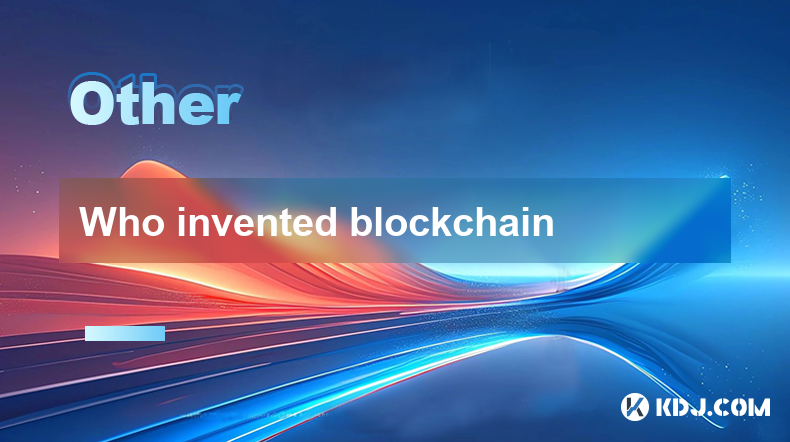
Key Points:
- The concept of a blockchain was first introduced by Stuart Haber and W. Scott Stornetta in 1991.
- Here's a detailed explanation of the history and key individuals behind blockchain invention
- How blockchain technology was developed and its evolution over time
- Different industries and sectors that blockchain technology is impacting
Content:
The Pioneering Visionaries: Stuart Haber and W. Scott Stornetta
In 1991, Stuart Haber, a computer scientist, and W. Scott Stornetta, a mathematician, published a seminal paper titled "How to Time-Stamp a Digital Document." This groundbreaking work introduced the concept of a blockchain as a secure and tamper-proof method for recording and verifying digital information.
Their proposed system utilized a linked list of blocks, where each block contained a cryptographic hash of the previous block and a timestamped record of the document being verified. This structure ensured the integrity and chronological order of the data, making it resistant to unauthorized alterations or deletions.
The Dawn of Blockchain: The Genesis Block
In 2008, Satoshi Nakamoto, an enigmatic figure, published a whitepaper outlining the Bitcoin cryptocurrency and its underlying blockchain technology. Bitcoin's blockchain, the Genesis Block, became the first practical application of the blockchain concept, revolutionizing the way digital assets and transactions could be secured and managed.
Nakamoto's design introduced the concept of a decentralized and distributed ledger, where every participant in the network maintained a copy of the blockchain. This decentralized architecture eliminated the need for a central authority, enhancing the security and transparency of the system.
Rapid Evolution and Diversification
The advent of Bitcoin sparked an explosion of research and development in blockchain technology. Various iterations and adaptations emerged, expanding the scope of its applications beyond cryptocurrencies.
- Ethereum (ETH): Introduced the concept of smart contracts, programmable code stored on the blockchain that could automate complex transactions and applications.
- Hyperledger Fabric: A modular and flexible blockchain framework designed for enterprise use cases, providing scalability, confidentiality, and privacy features.
- Cardano (ADA): A proof-of-stake blockchain known for its focus on scalability, security, and sustainability.
Industry Impact and Future Applications
Blockchain technology has found its way into a wide range of industries, transforming processes and unlocking new possibilities:
- Finance: Streamlined financial services, reduced transaction costs, and enhanced security in areas like cross-border payments and asset management.
- Supply Chain Management: Improved transparency and efficiency in supply chains, reducing fraud, optimizing inventory management, and enhancing product traceability.
- Healthcare: Secure and efficient medical recordkeeping, facilitating data sharing among healthcare providers, improving patient outcomes, and empowering patients with control over their health information.
FAQs Related to Blockchain History:
1. Who were the founders of blockchain technology?
Stuart Haber and W. Scott Stornetta introduced the concept in 1991, while Satoshi Nakamoto implemented it in a practical form with Bitcoin in 2008.
2. What is the first blockchain ever created?
The Genesis Block of the Bitcoin blockchain, created by Satoshi Nakamoto in 2008, is considered the first practical implementation of blockchain technology.
3. How has blockchain technology evolved over time?
Blockchain technology has evolved from a simple data structure to a complex ecosystem, incorporating concepts like smart contracts, proof-of-stake consensus mechanisms, and a range of enterprise-focused solutions.
4. What are the key industries impacted by blockchain technology?
Finance, supply chain management, healthcare, and entertainment are among the prominent industries adopting and benefiting from blockchain applications.
Disclaimer:info@kdj.com
The information provided is not trading advice. kdj.com does not assume any responsibility for any investments made based on the information provided in this article. Cryptocurrencies are highly volatile and it is highly recommended that you invest with caution after thorough research!
If you believe that the content used on this website infringes your copyright, please contact us immediately (info@kdj.com) and we will delete it promptly.
- Gold Dips from Record High as Market Turmoil Sparks Profit-Taking
- 2025-04-04 08:35:12
- Factors such as whale accumulation, bullish technical indicators, and market sentiment have contributed to this optimistic outlook.
- 2025-04-04 08:35:12
- With the crypto market entering a new growth cycle in 2025
- 2025-04-04 08:30:11
- EOS Price Defies the Market Crash: +46% in a Week!
- 2025-04-04 08:30:11
- BlockDAG (BDAG) Breaks Records With 2,380% Presale Price Jump, Outpacing Dogecoin (DOGE) and Kaspa (KAS)
- 2025-04-04 08:25:12
- Economic uncertainty and a major crypto exchange hack pushed down the total value locked in DeFi protocols to $156 billion in the first quarter of 2025
- 2025-04-04 08:25:12
Related knowledge

What are the future development trends of blockchain game development?
Apr 03,2025 at 05:00am
Blockchain technology has revolutionized various industries, and gaming is no exception. As we look to the future, several trends are set to shape the development of blockchain games. These trends not only promise to enhance the gaming experience but also to integrate blockchain technology more seamlessly into the gaming ecosystem. Let's explore these t...

What are the maintenance costs of blockchain system development?
Apr 03,2025 at 06:07pm
The maintenance costs of blockchain system development are multifaceted and depend on various factors. These costs can include technical maintenance, security updates, infrastructure expenses, and personnel costs. Understanding these elements is crucial for anyone planning to develop or maintain a blockchain system. Technical MaintenanceTechnical mainte...
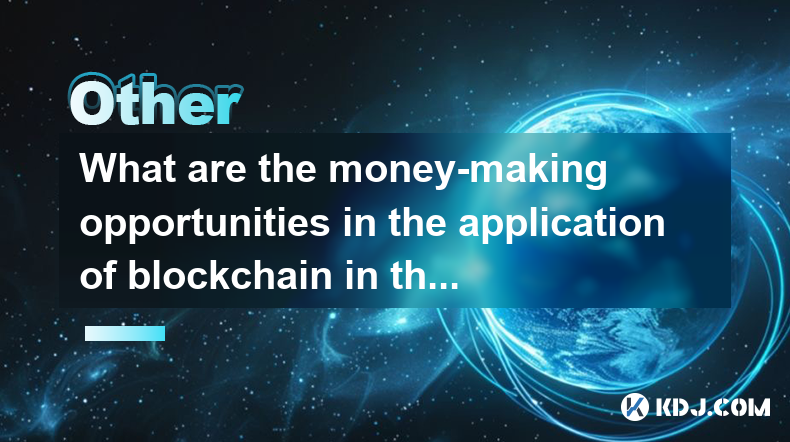
What are the money-making opportunities in the application of blockchain in the medical industry?
Apr 03,2025 at 03:35am
The integration of blockchain technology into the medical industry presents a myriad of money-making opportunities that can revolutionize healthcare systems. Blockchain's inherent characteristics, such as transparency, security, and immutability, make it an ideal solution for various medical applications. By leveraging blockchain, companies can develop ...
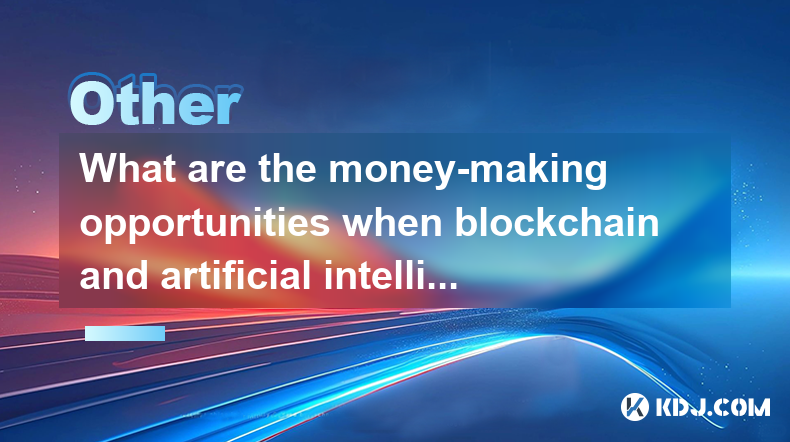
What are the money-making opportunities when blockchain and artificial intelligence are combined?
Apr 04,2025 at 01:28am
The convergence of blockchain and artificial intelligence (AI) presents a myriad of money-making opportunities within the cryptocurrency circle. This fusion leverages the decentralized and secure nature of blockchain with the analytical prowess of AI, creating innovative solutions and platforms that can generate significant revenue. From enhancing tradi...
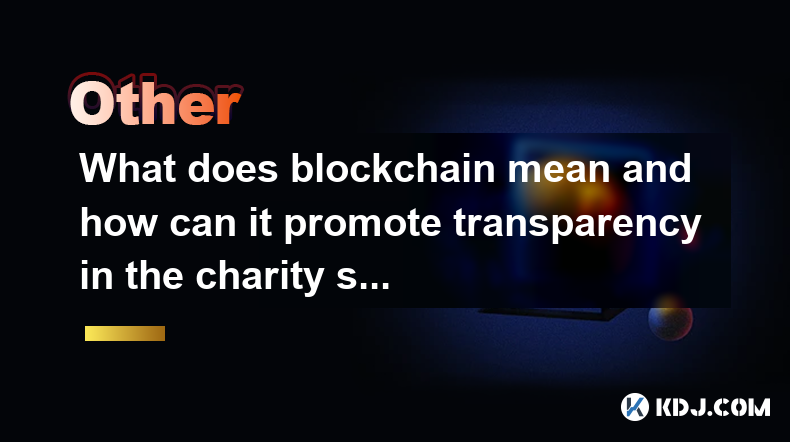
What does blockchain mean and how can it promote transparency in the charity sector?
Apr 03,2025 at 08:29pm
Blockchain technology is a decentralized, distributed ledger that records transactions across numerous computers. This ensures that the data is transparent and nearly impossible to alter retroactively. Essentially, blockchain serves as a digital ledger of all cryptocurrency transactions, enabling secure and direct exchanges without the need for intermed...
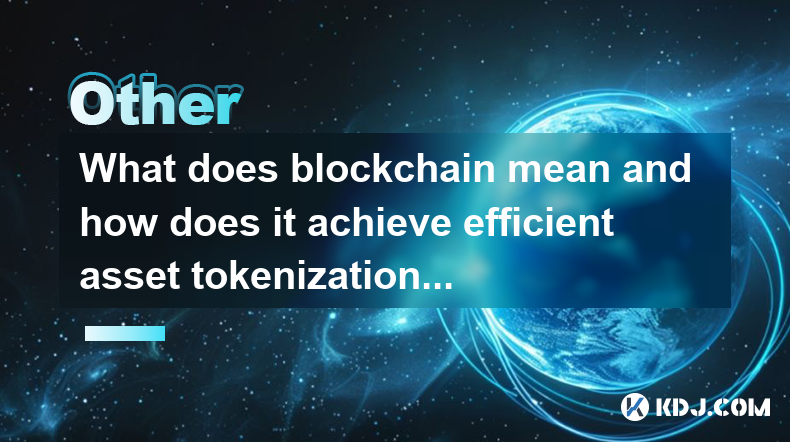
What does blockchain mean and how does it achieve efficient asset tokenization?
Apr 03,2025 at 07:57pm
Blockchain technology is a decentralized, distributed ledger that records transactions across numerous computers. It ensures that each transaction is secure, transparent, and immutable. The concept of blockchain was introduced with the launch of Bitcoin in 2009, but its applications have since expanded far beyond cryptocurrencies. At its core, blockchai...

What are the future development trends of blockchain game development?
Apr 03,2025 at 05:00am
Blockchain technology has revolutionized various industries, and gaming is no exception. As we look to the future, several trends are set to shape the development of blockchain games. These trends not only promise to enhance the gaming experience but also to integrate blockchain technology more seamlessly into the gaming ecosystem. Let's explore these t...

What are the maintenance costs of blockchain system development?
Apr 03,2025 at 06:07pm
The maintenance costs of blockchain system development are multifaceted and depend on various factors. These costs can include technical maintenance, security updates, infrastructure expenses, and personnel costs. Understanding these elements is crucial for anyone planning to develop or maintain a blockchain system. Technical MaintenanceTechnical mainte...

What are the money-making opportunities in the application of blockchain in the medical industry?
Apr 03,2025 at 03:35am
The integration of blockchain technology into the medical industry presents a myriad of money-making opportunities that can revolutionize healthcare systems. Blockchain's inherent characteristics, such as transparency, security, and immutability, make it an ideal solution for various medical applications. By leveraging blockchain, companies can develop ...

What are the money-making opportunities when blockchain and artificial intelligence are combined?
Apr 04,2025 at 01:28am
The convergence of blockchain and artificial intelligence (AI) presents a myriad of money-making opportunities within the cryptocurrency circle. This fusion leverages the decentralized and secure nature of blockchain with the analytical prowess of AI, creating innovative solutions and platforms that can generate significant revenue. From enhancing tradi...

What does blockchain mean and how can it promote transparency in the charity sector?
Apr 03,2025 at 08:29pm
Blockchain technology is a decentralized, distributed ledger that records transactions across numerous computers. This ensures that the data is transparent and nearly impossible to alter retroactively. Essentially, blockchain serves as a digital ledger of all cryptocurrency transactions, enabling secure and direct exchanges without the need for intermed...

What does blockchain mean and how does it achieve efficient asset tokenization?
Apr 03,2025 at 07:57pm
Blockchain technology is a decentralized, distributed ledger that records transactions across numerous computers. It ensures that each transaction is secure, transparent, and immutable. The concept of blockchain was introduced with the launch of Bitcoin in 2009, but its applications have since expanded far beyond cryptocurrencies. At its core, blockchai...
See all articles






















































































